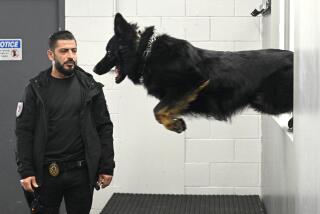LAPD rejects South Korean Jindos as police dogs
- Share via
Reporting from Seoul — In a canine experiment in better policing, the LAPD recently spent months training a pair of South Korean-bred Jindo puppies as possible new street enforcement partners.
But the Jindos are in the doghouse as a replacement for more traditional European bloodlines, such as German shepherds or Belgian Malinois. The loyal but excitable Jindos, officials said, just didn’t take to the exacting work of crowd control, weapons detection and drug sniffing.
“We worked hard with the dogs to develop their skills of sniffing out the odor of guns for detective work,” said Sgt. Doug Roller, chief trainer for the K-9 platoon of the Los Angeles Police Department’s Metropolitan Division. “They pretty much mastered the task, but once they got out of the training environment, they got distracted in the real world.... A leaf would blow, and they’d go chase it.”
The Jindos — named Daehan and Mingook, which together translate as “Republic of Korea” — have been placed in private homes after trainers determined they lacked sufficient focus and consistency.
Those skeptical of Jindos as police dogs, including many owners, say such behavior is common in the breed, which they say is prone to roam and bolt. Many say the affectionate dogs, though they are good household pets, are often overly independent and therefore difficult to train. They also tend to be dominant with other dogs.
In other words, many say, they’re not exactly the team players needed for police work.
Last fall, Roller and fellow department trainer Jeff Miller traveled to South Korea on an all-expenses-paid trip to select dogs for training. South Korean breeders have promoted the mid-size Jindos, brought here by invading Mongolian armies in the 13th century, as the newest generation of K-9 dog.
Jindos, praised here for their intelligence and hunting skills, are so beloved that they’ve been declared a national treasure. A breeding association offered two pairs of dogs for free to police departments in Los Angeles and Glendale.
Glendale police decided not to accept the dogs for training after the LAPD rejected the Jindos.
David Inglis, a Ventura County dog trainer who contracts with Glendale police, said Jindos were wild hunter dogs that became domesticated over the centuries.
“It’s difficult for a true hunting dog to do the things that police want them to do,” he said. “It’s like taking a horse used for plowing and trying to make it a racehorse. You could race it, but it would never win. Jindos are very street-smart. But they’re not police dogs.”
The LAPD’s Miller handled Mingook, a butterscotch-colored male, and Roller took charge of Daehan, a white female. Both dogs were trained at the officers’ homes.
Mingook excelled at sniffing out gun odors even as a puppy, but he often became aggressive around other dogs. Daehan, meanwhile, turned out to be a good companion dog.
“Most puppies go through adolescent periods where they do dumb and irritating things, such as chewing on things, but I trained her right away that there were rules and boundaries. And she followed them,” Roller said. “She wasn’t a knucklehead. She was easygoing, even if she did demonstrate a little dominance over other dogs.”
Roller said he would have kept Daehan as a pet, but he already has four dogs. He said the breed would require a few more generations of specific selection to weed out unsuitable habits.
“Daehan just wanted to please me, while a good police dog does its work to stay on the hunt and stay focused to satisfy a drive, not to please its master,” he said. “If I wasn’t there, she’d go off task. We kept waiting to see if things would change, but they didn’t.”
More to Read
Sign up for Essential California
The most important California stories and recommendations in your inbox every morning.
You may occasionally receive promotional content from the Los Angeles Times.











